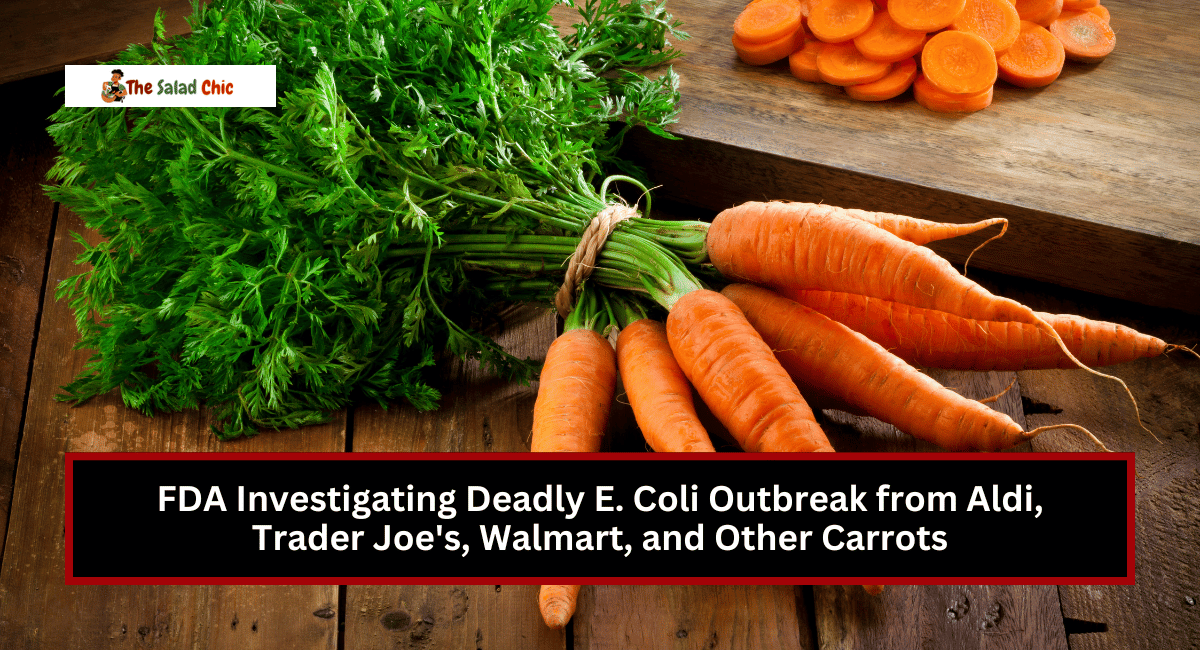The U.S. Food and Drug Administration (FDA) and the Centers for Disease Control and Prevention (CDC) are investigating a deadly outbreak of E. coli linked to whole and baby carrots sold in major grocery chains across the U.S., Puerto Rico, and Canada.
Grimmway Farms, the producer of the contaminated carrots, issued a voluntary recall on November 16 after reports of illnesses surfaced.
Here’s everything you need to know about the recall, the affected products, and how to keep yourself and your family safe.
Which Stores Sold the Contaminated Carrots?
The contaminated carrots were sold nationwide at popular stores such as:
- Aldi
- Kroger
- Publix
- Target
- Trader Joe’s
- Walmart
- Wegmans
- Whole Foods
Other stores that carry these products include Sprouts, LIDL, Raley’s, and many others. The recall consists of products with “Best If Used By” dates ranging from August 14 through November 12.
Brands Involved in the Recall
The FDA and Grimmway Farms identified several well-known brands in this recall. These include:
- 365 (Whole Foods brand)
- Bunny Luv
- Cal-Organic
- Compliments
- Full Circle
- Good & Gather (Target brand)
- Marketside (Walmart brand)
- Nature’s Promise
- O Organics
- Simple Truth (Kroger brand)
- Trader Joe’s
- Wegmans
- Wholesome Pantry
The recall covers both whole organic carrots and pre-packaged baby carrots. You must check your fridge immediately if you purchased carrots from these brands during the affected timeframe.
What Should You Do with Recalled Carrots?
If you have these carrots in your home:
- Do not eat them. Even if they look or smell fine, consuming them can put your health at risk.
- Dispose of the carrots safely. Seal them in a plastic bag and throw them away.
- Sanitize surfaces. Clean any surfaces the carrots may have touched, such as cutting boards, countertops, or refrigerator shelves.
States Reporting E. Coli Cases
The CDC has confirmed 39 illnesses, 15 hospitalizations, and one death across 18 states, including:
- Arkansas
- California
- Massachusetts
- Michigan
- North Carolina
- New York
- Texas
- Washington
Stay alert for symptoms if you live in these states and have consumed carrots from the recalled brands.
Symptoms of E. Coli to Watch For
E. coli symptoms can appear 3–4 days after consuming contaminated food but may appear as early as 24 hours or as late as 10 days. Common symptoms include:
- Severe stomach cramps
- Diarrhea (sometimes bloody)
- Vomiting
- Fever over 102°F (39°C)
- Dizziness or dehydration
While most people recover without treatment, some may develop severe complications, such as kidney failure. Contact your doctor immediately if symptoms are severe or persistent.
Grimmway Farms’ Response and Contact Information
Grimmway Farms, the producer of the contaminated carrots, has issued a voluntary recall and is cooperating with federal agencies to address the outbreak. For more information, consumers can contact Grimmway Farms customer service:
- Phone: 1-800-301-3101 (Monday–Friday, 8 a.m. to 8 p.m. ET)
- Website: www.grimmway.com
How to Stay Safe Moving Forward
To protect yourself from future risks:
- Scrutinize all fresh produce. Always wash and peel carrots before consuming.
- Be cautious about expiration dates. Avoid eating products past their “Best If Used By” dates.
- Stay informed. Follow updates from the FDA and CDC on recalled products and outbreaks.
Conclusion
E. coli outbreaks serve as a reminder of the importance of food safety. While the contaminated carrots may no longer be sold in stores, they could still pose a risk if stored in homes. By disposing of affected products and staying vigilant about symptoms, you can help protect yourself and your loved ones.
Don’t hesitate to contact Grimmway Farms or consult your local health department with any questions or concerns.
FAQs
What is the source of contamination in these carrots?
The contamination is caused by Shiga Toxin-producing E. coli, a harmful bacteria that can lead to severe illness.
Are the contaminated carrots still being sold?
The contaminated carrots are no longer available for sale, but they may still be in consumers’ homes.
Can washing the carrots remove E. coli?
No, washing alone cannot guarantee the removal of E. coli. It’s best to discard any recalled carrots.
What should I do if I’ve already eaten the recalled carrots?
Monitor yourself for symptoms such as stomach cramps, diarrhea, or fever. If symptoms develop, contact your healthcare provider immediately.
How can I stay updated about this outbreak?
Check the FDA’s website and follow CDC announcements for ongoing updates about the recall and outbreak investigation.
READ MORE: Aldi’s Beautiful Holiday Glassware Is $4—and Selling Out Fast

